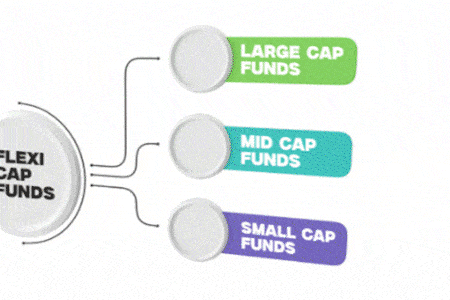Understanding FlexiCap Mutual Funds
Flexi-cap funds, as the name suggests, take a flexible approach and invest in large-cap, mid-cap, and small-cap companies by market capitalisation in India. Apart from diversification and flexibility, these funds offer relatively better risk-adjusted returns than category funds like large-cap funds.
Flexi cap funds offer flexibility and diversification in diverse market conditions.
These funds are suitable for beginners or conservative investors.
Held for at least 5 years.

Top schemes of Flexi Cap Mutual Funds
| Fund Name | Returns | Actions | ||
|---|---|---|---|---|
| 1 Year | 3 Year | 5 Year | ||
Returns calculator
Total Invested : ₹ 6,00,000
Profit : ₹ 56,200,000
Current value : ₹ 1,16,20,000
Frequently Asked Questions
Which is the best flexi cap fund?
Many investors choose the top-performing fund based on short-term performance. However, you should consider these factors to select the best flexicap fund for you:
Investment philosophy: like momentum, value, quality, etc.
Performance consistency: through rolling returns, market capture ratio, etc.
Risk metrics: like the Sharpe ratio, alpha, and standard deviation
Fund size and expense ratio
Which is better, a hybrid fund or a flexi-cap fund?
Investment Type:
Hybrid Fund: Invests in a mix of equity and debt to balance risk and returns.
Flexi Cap Fund: Invests only in equities across large-, mid, and small-cap stocks.
Risk Level:
Hybrid Fund: Moderate risk (lower risk due to debt component).
Flexi Cap Fund: High risk (fully exposed to market fluctuations).
Returns Potential:
Hybrid Fund: Typically 8-12% returns (more stable).
Flexi Cap Fund: Typically 12-18% returns (but highly volatile).
Market Fluctuation Impact:
Hybrid Fund: Lower impact due to the debt portion acting as a cushion.
Flexi Cap Fund: Higher impact, as it is fully equity-based.
Who Manages Risk?
Hybrid Fund: The Fund manager adjusts the equity-debt balance based on market conditions.
Flexi Cap Fund: Fund manager shifts between large, mid, and small-cap stocks but remains in equities.
Best Investment Horizon:
Hybrid Fund: Suitable for 3-5 years.
Flexi Cap Fund: Best for 5-10 years.
What is the difference between Multicap and Flexicap funds?
Multi-Cap Fund: SEBI mandates a minimum of 25% allocation each in large-cap, mid-cap, and small-cap stocks.
Flexi-Cap Fund: No such restriction; the fund manager can dynamically allocate across market caps.
What is the return of Flexicap?
Flexicap funds have offered 14.83% since inception. Please note that past performance may or may not be repeated.
Is the Flexi Cap fund tax-saving?
No, Flexi cap funds are not tax-saving funds. They fall under the equity mutual funds category and do not provide tax benefits under Section 80c of the Income Tax Act.
Consider an equity-linked savings Scheme (ELSS) if you are looking for tax-saving mutual funds. However, it comes with a 3-year lock-in period.
Which is the best flexi cap fund to start an SIP?
Multiple funds would be termed as the 'best flexi cap fund.' You should define your risk profile, goals, and time horizon before selecting one.
Who should invest in flexi-cap mutual funds?
Flexi cap funds are best suited for
Medium to long term during
Investors Seeking Diversification
Don't want active tracking and rebalancing between market caps